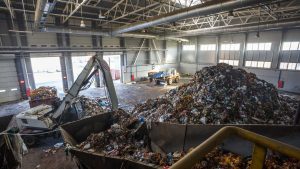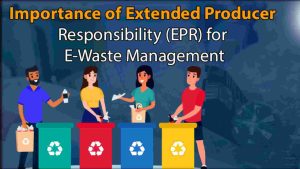![]()
EPR and Government Initiatives: A Collaborative Approach to Tackling Plastic Pollution in India: Plastic pollution is an environmental challenge globally that has far-reaching consequences for ecosystems, public health, and the economy. India, with its large and growing population, faces a significant plastic waste problem. To address this issue, a collaborative approach involving Extended Producer Responsibility (EPR) and government initiatives is crucial. This blog explores the role of EPR and the various government measures in mitigating plastic pollution in India.
1. Extended Producer Responsibility (EPR)
EPR is a policy that places the responsibility for the end-of-life management of products, including their packaging, on manufacturers, importers, and retailers. EPR is grounded in the “polluter pays” principle, emphasising that those who produce and profit from products should also be responsible for their environmentally sound disposal. EPR motivates producers to design products that are less harmful to the environment, more durable, and easier to recycle or dispose of responsibly.
In India, the EPR concept was launched as part of the Plastic Waste Management (PWM) Rules 2016. These rules mandate that producers of plastic products are responsible for collecting and managing the waste generated from their products.
This shift in responsibility has led to several positive outcomes in the fight against plastic pollution:
- Increased Recycling Rates: EPR has encouraged producers to set up collection and recycling systems for their products. As a result, more plastic waste is being recycled and diverted from landfills and the environment.
- Improved Product Design: Manufacturers are incentivised to create products with reduced environmental impact, such as using less plastic, making products more accessible to recycle, and exploring alternative materials.
- Public Awareness: EPR has raised awareness among consumers about the environmental impact of plastic products, leading to more responsible consumption and disposal practices.
- Job Creation: The plastic recycling industry has grown, creating employment opportunities, particularly in the informal sector.
2. Government Initiatives to Combat Plastic Pollution
In addition to EPR, the Indian government has taken various initiatives to address the plastic pollution problem. These initiatives aim to regulate, reduce, and manage plastic waste while promoting sustainable practices.
- Ban on Single-Use Plastics: In 2019, the Indian government announced a comprehensive ban on single-use plastic items, including carry bags, straws, and disposable cutlery. This ban has significantly reduced the use of these items, helping to decrease plastic pollution.
- Swachh Bharat Abhiyan (Clean India Campaign): The Swachh Bharat Abhiyan is a countrywide cleanliness campaign launched in 2014. One of its key objectives is to eliminate open defecation and promote waste segregation and management, including properly disposing of plastic waste.
- Plastic Waste Management Rules, 2016: These rules outline the responsibilities of various stakeholders in the plastic waste management chain, such as waste generators, local authorities, and producers. They require the segregation, collection, and recycling of plastic waste.
- National Clean Air Program: Air pollution is closely linked to plastic waste burning, a common practice in India. The National Clean Air Program aims to reduce air pollution levels in 102 cities, addressing the health risks associated with plastic waste incineration.
- Swachh Survekshan: The annual cleanliness survey assesses the cleanliness and sanitation of Indian cities. It encourages urban local bodies to manage waste more effectively, including plastic waste.
3. Collaborative Approach
To effectively tackle plastic pollution in India, a collaborative approach between the government and various stakeholders is essential. The following key components are vital for this collaborative effort:
- Public Awareness and Education: The government, in partnership with NGOs and the private sector, should undertake awareness campaigns to educate the public about the environmental consequences of plastic pollution. These initiatives can empower citizens to make more sustainable choices in their daily lives.
- Infrastructure Development: The government can invest in developing recycling and waste management infrastructure. This will provide producers with the means to meet their EPR obligations effectively and promote a circular economy for plastics.
- Regulatory Framework: Regular updates and revisions of plastic waste management rules and policies are necessary to adapt to changing circumstances and emerging challenges. The government must ensure that the EPR framework remains effective and that penalties for non-compliance are strictly enforced.
- Innovation and Research: Collaboration with research institutions and private enterprises can drive innovation in plastic alternatives and recycling technologies. These efforts can lead to more sustainable product design and waste management practices.
- Stakeholder Engagement: Involve stakeholders from various sectors, including industry, civil society, and academia, in shaping policies and strategies. Engaging diverse perspectives can lead to more effective solutions and increased compliance with EPR regulations.
4. Challenges and Opportunities
While EPR and government initiatives have made significant strides in addressing plastic pollution in India, several challenges persist. These challenges must be met with the latest solutions and strong commitment:
- Informal Recycling Sector: The informal sector plays a significant role in plastic waste recycling in India. However, it often lacks proper training and safety measures. Collaborative efforts should focus on integrating this sector into the formal economy while ensuring decent working conditions and safety.
- Lack of Infrastructure: Adequate infrastructure for plastic waste recycling and collection is still lacking in many parts of the country. Public and private investment is necessary to build the required infrastructure.
- Enforcement and Compliance: Stricter enforcement of EPR regulations is required to ensure that producers meet their responsibilities. Compliance rates need to improve to make EPR more effective.
- Plastic Alternatives: While reducing plastic usage is crucial, the availability and affordability of alternatives remain challenges. Collaboration with industry and research institutions can expedite the development and adoption of sustainable options.
Conclusion
Tackling plastic pollution in India is a complex challenge that requires a multi-pronged approach. Extended Producer Responsibility, combined with government initiatives and collaborative efforts, is a promising strategy to reduce plastic waste and its environmental impact. The Indian government, industry, civil society, and the public must work together to develop a sustainable, circular economy for plastics and ensure a cleaner, healthier environment for all. With the right policies, infrastructure, and public awareness, India can significantly reduce its plastic pollution footprint and set an example for the world.





